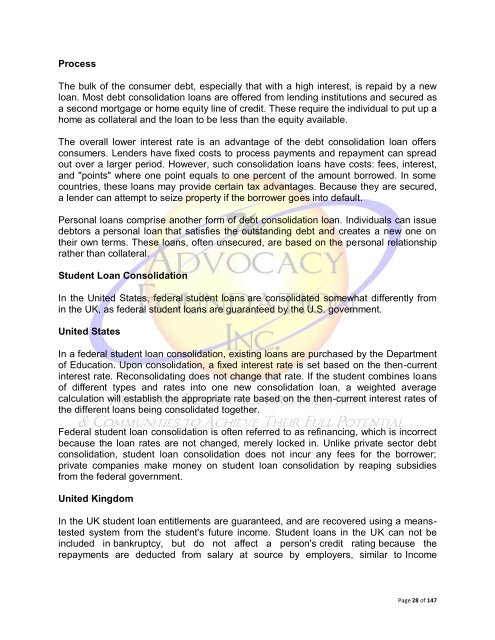Debt Reduction & Debt Relief
Debt Reduction & Debt Relief
Debt Reduction & Debt Relief
You also want an ePaper? Increase the reach of your titles
YUMPU automatically turns print PDFs into web optimized ePapers that Google loves.
Process<br />
The bulk of the consumer debt, especially that with a high interest, is repaid by a new<br />
loan. Most debt consolidation loans are offered from lending institutions and secured as<br />
a second mortgage or home equity line of credit. These require the individual to put up a<br />
home as collateral and the loan to be less than the equity available.<br />
The overall lower interest rate is an advantage of the debt consolidation loan offers<br />
consumers. Lenders have fixed costs to process payments and repayment can spread<br />
out over a larger period. However, such consolidation loans have costs: fees, interest,<br />
and "points" where one point equals to one percent of the amount borrowed. In some<br />
countries, these loans may provide certain tax advantages. Because they are secured,<br />
a lender can attempt to seize property if the borrower goes into default.<br />
Personal loans comprise another form of debt consolidation loan. Individuals can issue<br />
debtors a personal loan that satisfies the outstanding debt and creates a new one on<br />
their own terms. These loans, often unsecured, are based on the personal relationship<br />
rather than collateral.<br />
Student Loan Consolidation<br />
In the United States, federal student loans are consolidated somewhat differently from<br />
in the UK, as federal student loans are guaranteed by the U.S. government.<br />
United States<br />
In a federal student loan consolidation, existing loans are purchased by the Department<br />
of Education. Upon consolidation, a fixed interest rate is set based on the then-current<br />
interest rate. Reconsolidating does not change that rate. If the student combines loans<br />
of different types and rates into one new consolidation loan, a weighted average<br />
calculation will establish the appropriate rate based on the then-current interest rates of<br />
the different loans being consolidated together.<br />
Federal student loan consolidation is often referred to as refinancing, which is incorrect<br />
because the loan rates are not changed, merely locked in. Unlike private sector debt<br />
consolidation, student loan consolidation does not incur any fees for the borrower;<br />
private companies make money on student loan consolidation by reaping subsidies<br />
from the federal government.<br />
United Kingdom<br />
In the UK student loan entitlements are guaranteed, and are recovered using a meanstested<br />
system from the student's future income. Student loans in the UK can not be<br />
included in bankruptcy, but do not affect a person's credit rating because the<br />
repayments are deducted from salary at source by employers, similar to Income<br />
Page 28 of 147

















